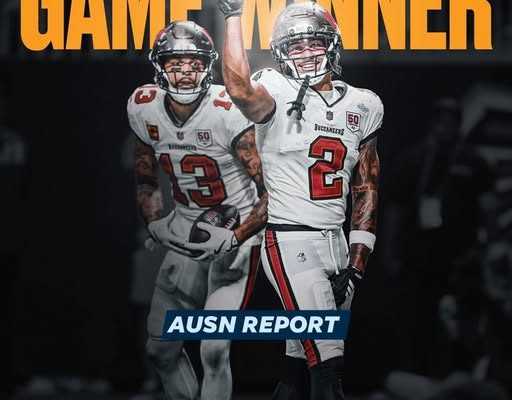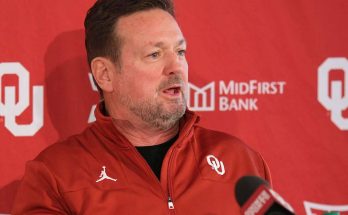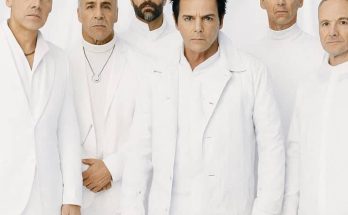The night had settled into tension, the scoreboard ticking like a metronome of mounting anxiety. Atlanta’s Mercedes‑Benz Stadium buzzed with the kind of anticipation that only a razor‑thin contest can summon—23–20, Falcons holding the lead, and the clock slipping away. On the Tampa Bay sideline, the air was heavy with the realization that the season opener hung in the balance. Rookie sensation Emeka Egbuka, making his first NFL appearance, surveyed the field with a calm intensity that seemed almost paradoxical. He was the debutant, the fresh face, but he carried a demeanor that belonged to a seasoned veteran.
Down 20–17, with just 1:04 to go, the Buccaneers huddled. They’d retooled their offense—Jalen McMillan out, Chris Godwin still on the mend. Mike Evans remained the elder statesman of the receiving room, anchoring a unit in flux. But the spark came from the newcomer. Egbuka—drafted 19th overall out of Ohio State—stood in the huddle and simply called his shot. In plain sight, he asked for a post route. That kind of audacity, so early in a player’s career, isn’t scripted. It doesn’t feel staged. It feels inevitable.
They lined up in a five‑wide set, empty backfield, trips to the right. Egbuka ran the post on the outside; Evans ran an in‑route just to his left, and Shepard ran a hitch—layering routes to overload the defense. With Evans commanding the middle of the field, Egbuka found single coverage on the outside—a one‑on‑one opportunity he’d been born to exploit. That’s football poetry: alignment, timing, route, the trust baked into every rep.
Quarterback Baker Mayfield, ever the gunslinger, trusted the plan. And he trusted Emeka. The ball sailed on a 25‑yard aerial. Egbuka didn’t just make the catch—he snared it with conviction, nearly lost in the glare of passing lights, but completely in command. It was a moment made of purity: precision, concentration, connection.
“Shoot to kill,” Egbuka later would say—his personal mantra for that high‑pressure moment (ESPN). The phrase burst with confidence—maybe audacious, maybe brash—but entirely earned. In that split‑second, the rookie wasn’t just playing the game; he was redefining what composure looks like. The Bucs held a 23–20 lead, the crowd a mixture of stunned silence and quickening heartbeats.
Behind them, Mayfield leaned into the MVP soundtrack of the moment: “Get to the two‑minute warning and then gather your breath and go,” he said. “It wasn’t about getting the field goal to tie and go to overtime. We were looking to go score”(ESPN).
The Falcons’ response came fast. Rookie QB Michael Penix Jr. orchestrated a near‑marathon drive of 18 plays, nearly eight minutes of relentless determination. They punched it to the 1, scoring with 2:17 to go. Suddenly, the drama peaked again: Brady kicker Younghoe Koo trotted in for a 44‑yard field goal attempt that would tie the game—and instead pushed it wide right (Reuters, Bucs Nation, The Falcoholic).
That miss sealed the Buccaneers’ win. But the real story—the heartbeat of the narrative—was the rookie’s moment of authority in the huddle. The audacity. The execution. The realization in real time that Tampa Bay may have unearthed something special: not just talent, but presence.
This wasn’t a talent void. The team had strategic depth. Mike Evans had been the constant: perennial 1,000‑yard seasons; a legacy carved through toughness and consistency. He publicly expressed excitement about Egbuka joining the group, offering glowing comparisons—“looks like a running back, but catches like Chris Godwin”—and calling him “a very polished, very well‑rounded player” (NFL.com, Our Community Now). Now, Egbuka had proven he wasn’t just a polished prospect—he was a clutch performer.
Off the field, Egbuka had built a reputation for preparation, detail, and intelligence. A team captain at Ohio State, he had mastered the nuance of routes, had the “why” as much as the “how” ). In Tampa Bay, he’d leaned into the mentorship of veterans—Sterling Shepard dissecting routes with him after practice, Mike Evans and Chris Godwin offering insight on everything from the playbook to professionalism (SI, Motociclismo).
Yet none of that mentorship, none of that film breakdown, crystallized like that moment in Atlanta. Under the brightest lights, rookie composure met veteran level execution. He didn’t just catch a touchdown; he audibly asked for it. And got it. That’s legacy crafting in a micro‑second.
For Mike Evans, for Baker Mayfield, for Todd Bowles, this game meant more than the 1–0 start. It meant that the future wasn’t distant—it was here. The receiving room, already revered as one of the deepest in the league, had gained a new armament: Smarts. Precision. Fearlessness.
Because make no mistake, this moment is a window into something larger. Emeka Egbuka didn’t just earn a crest in the box score—four receptions, 67 yards, two touchdowns, the game‑winner in his NFL debut \. He earned trust. He earned presence. He earned his place.
And maybe most importantly, he rewrote the narrative about what a rookie can deliver. Entrenched veterans are great, but they’re not impervious. And rookies are not always inexperienced, timid, or star‑struck. In Egbuka, Tampa has a hybrid: rookie throatiness with veteran calm. That night, on that play, all of it converged into a highlight reel — but more than that, into a promise of days to come.
So here’s to the kid who in the huddle said, “Run the post,” and then ran away with the part everyone will remember. Football fans will talk about late‑game flurries, comeback mechanics, defensive stands—but when the ocean of emotion settles, what’s left is the vision. Egbuka saw it. He called it. And he lived it.
From now on, whenever someone asks what NFL boldness looks like, here’s the answer: Emeka Egbuka, Week 1, rookie debut, “shoot to kill” mindset, and a post route that defined the game.



